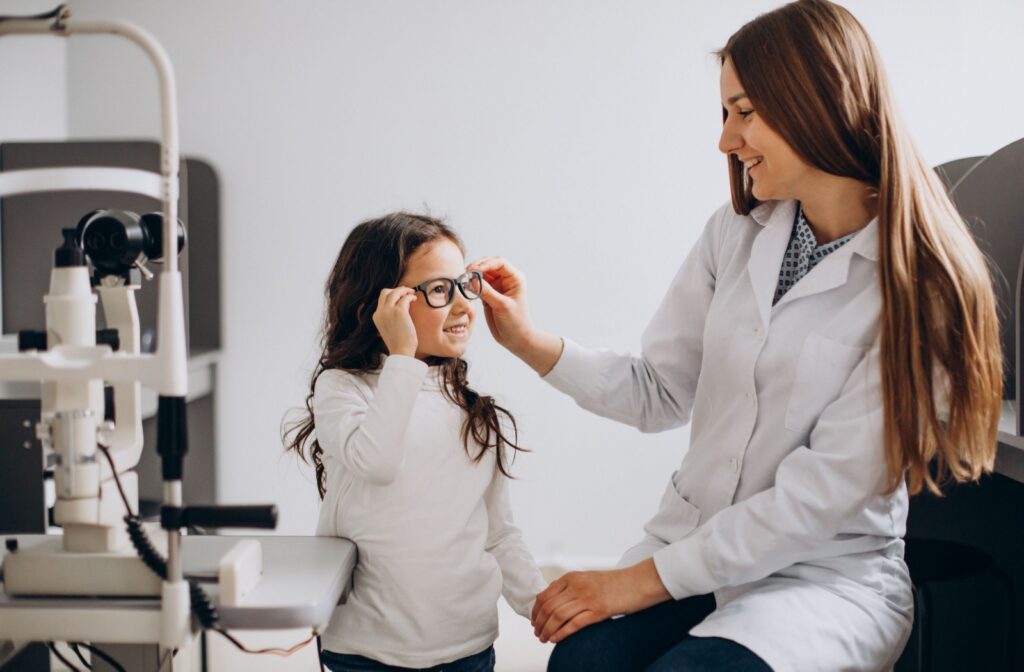In our digitally-inclined world, staring at screens for prolonged periods has become the norm, leading to an increase in eye-related issues, particularly myopia.
Commonly known as nearsightedness, myopia is a condition where distant objects appear blurry while close ones can be seen clearly. This refractive error occurs when the eyeball is too long or the cornea is too curved, causing light to focus in front of the retina instead of on it.
With rising concerns about eye health, many wonder if myopia can be effectively cured. While myopia can’t be cured, it can be managed with treatments like glasses, contact lenses, or surgery. Myopia management starts with an eye exam at Hazleton Eye Specialists!
The Nature of Myopia
Myopia affects a significant portion of the global population. It often develops in childhood and can progress with age. Genetics play a crucial role, but environmental factors such as extensive screen time, lack of outdoor activities, and poor lighting conditions during reading or studying also contribute significantly. Understanding myopia’s nature is vital in addressing its management and potential cure.
Current Treatments
While there is no definitive cure for myopia, various treatments are available to manage and correct its symptoms. These include:
Corrective Lenses
Corrective lenses, including eyeglasses and contact lenses, are the most prevalent solutions for myopia. Eyeglasses are easy to use and can be customized for various visual needs, such as bifocal or multifocal lenses for reading and distance.
Glasses provide a non-invasive approach to correcting vision and are suitable for most people, including children.
Contact lenses offer a wider field of view and are less susceptible to weather conditions like rain or fog. Soft lenses are comfortable and easy to adapt to, while rigid gas-permeable lenses provide sharper vision for some wearers.
Orthokeratology
Orthokeratology, or ortho-k, involves wearing specially designed rigid gas-permeable contact lenses overnight. These lenses temporarily reshape the cornea, allowing for clear vision during the day without the need for glasses or contacts.
Ortho-k is particularly beneficial for those who participate in sports or work in environments where glasses and contact lenses are impractical. This method is ideal for mild to moderate myopia and is commonly used in children to slow the progression of myopia.
Pharmacological Treatments
Atropine eye drops are a promising treatment for slowing the progression of myopia. Low-dose atropine is used to dilate the pupil and relax the eye muscles, which appears to slow down the changes in the eye that cause myopia to worsen. While not a cure, atropine can be a preventive measure to manage worsening conditions.
This treatment is non-invasive and can be easily incorporated into a daily routine. It is generally safe, with minimal side effects, though some users may experience light sensitivity or difficulty with near vision. It’s best suited for children and adolescents in whom myopia is still progressing.
Laser Surgery
Laser surgery, such as LASIK (Laser-Assisted In Situ Keratomileusis) and PRK (Photorefractive Keratectomy), offers a permanent solution by reshaping the cornea to correct the refractive error. These procedures can significantly reduce or eliminate the need for glasses or contact lenses.
Candidates for laser surgery typically include adults with stable prescriptions, generally over the age of 18. This treatment offers the advantage of long-term correction and the freedom from daily lens maintenance.
Not everyone is a suitable candidate for laser eye surgery, however. Those with thin corneas, severe dry eyes, or unstable prescriptions may not qualify. Additionally, while effective, the results may diminish over time as myopia progresses or due to age-related changes in vision.
Potential for Future Cures
The pursuit of a definitive cure for myopia is ongoing. Researchers are exploring various avenues including:
- Lifestyle Changes: Encouraging outdoor activities in children has been shown to slow myopia progression. Natural sunlight and distance viewing help in maintaining eye health.
- Technological Advancements: Innovations such as specialized contact lenses and spectacles are being developed to not only correct vision but also slow down myopia progression. These lenses work by altering the way light enters the eye, reducing stress on the eyes’ focusing mechanisms.
- Genetic Research: Understanding the genetic basis of myopia could lead to breakthroughs in prevention and treatment. Gene therapy might offer potential solutions in the future.
- Vision Therapy: Comprehensive vision therapy programs can enhance visual skills and correct specific visual issues, supporting better overall eye health.

The Importance of Regular Eye Exams
Regular eye exams are crucial in managing myopia. Early detection can prevent complications and allow for timely intervention. Eye specialists can tailor a management plan with corrective lenses, lifestyle advice, and potential treatments like atropine drops or orthokeratology.
At Hazleton Eye Specialists, our services range from standard eye exams to specialized treatments like scleral lenses and vision therapy, allowing us to provide you with personalized care for myopia and much more.
Embracing a Future of Hope & Clarity
While a complete cure for myopia remains elusive, significant strides are being made in its management and potential treatment. Emphasizing lifestyle changes, utilizing technological advancements, and maintaining regular eye exams are essential steps in managing myopia.
As research progresses, the hope is to move closer to a world where myopia can be effectively cured, enhancing the quality of life for millions globally. Until then, taking proactive measures can help manage myopia’s impact on daily living, ensuring clearer, healthier vision for the future.Take the first step towards better vision today by scheduling your eye exam with us at Hazleton Eye Specialists. Our team is dedicated to providing personalized treatment options, including myopia management and vision therapy, to meet your unique needs. Don’t wait for vision problems to progress—proactive eye care can make all the difference.



